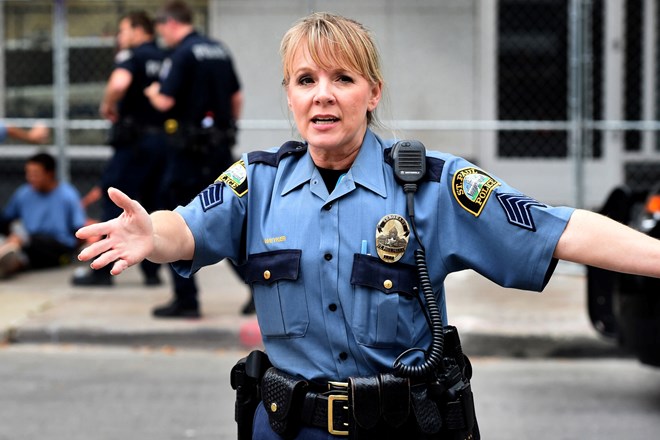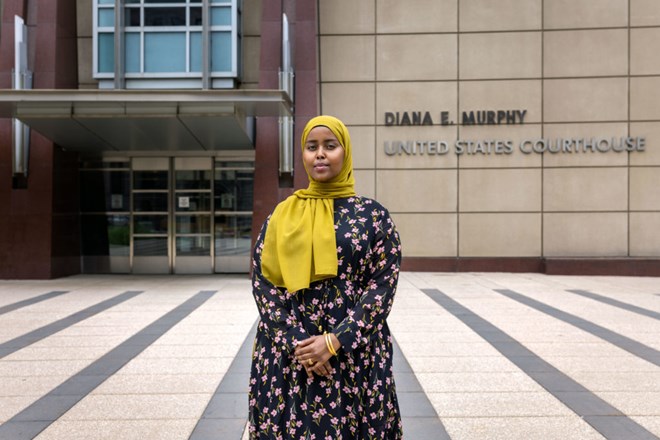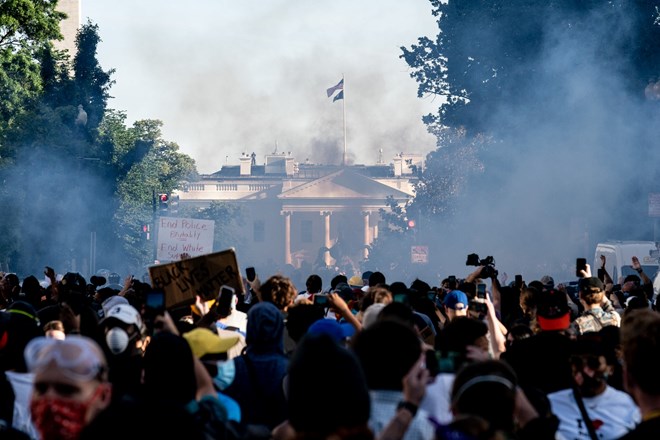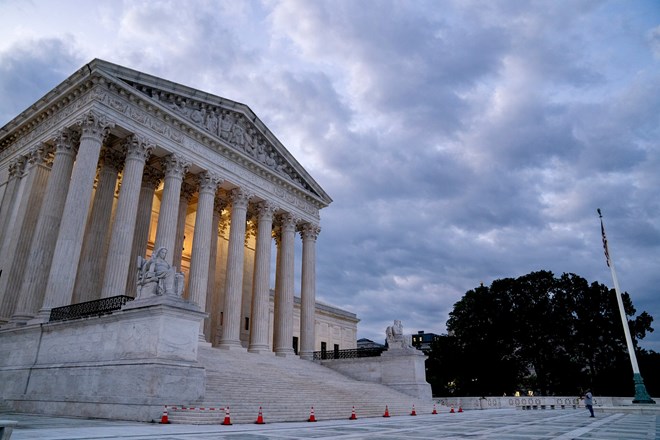
Sunday September 12, 2021
By Shaila Dewan
Federal agents and police officers who work with them are often immune from lawsuits, even for serious rights violations. The Supreme Court is being asked to re-evaluate that.

Heather Weyker in St. Paul, Minn., in 2016.Credit/Pioneer Press
In 2010, Officer Heather Weyker of the St. Paul Police Department in Minnesota had the biggest case of her career: a child sex-trafficking ring said to have spanned four states and involved girls as young as 12. Thirty people, almost all of them Somali refugees, were charged and sent to jail, many of them for years.
Then the case fell apart. It turned out, the trial judge found, that Officer Weyker had fabricated or misstated facts, lied to a grand jury and lied during a detention hearing. When three young women unwittingly got in the way of her investigation, according to their court filings, she had them locked up on false charges.
“She took my life away,” said one of the women, Hamdi Mohamud, who was a senior in high school at the time.
But there is little Ms. Mohamud can do. For decades, the Supreme Court and Congress have declined to close the many legal loopholes, like qualified immunity, that protect the police from accountability. Now legal advocates say that an increasingly conservative Supreme Court has emboldened lower courts to close off the few avenues that plaintiffs once had to seek redress.
“If a federal law enforcement officer lies, manipulates witnesses, and falsifies evidence, should the officer be liable for damages?” the U.S. Court of Appeals for the Eighth Circuit wrote of Officer Weyker, whose investigation ultimately resulted in no convictions. The answer was no.
More than 20 civil lawsuits have been filed against Officer Weyker, a former vice officer who is still the subject of an internal department investigation. Some of the suits failed because she was granted qualified immunity, a doctrine created by the courts that shields officers from lawsuits unless they violate a “clearly established” right.
In others, the courts found that if the facts before them were to be believed, she had indeed violated people’s rights. But she was shielded by an even more robust immunity offered to federal law enforcement officers — even though she is not one.

Hamdi Mohamud/ Institute for Justice
The protection extends not just to federal agents but to state and local police officers who, like Officer Weyker, serve on one or another of the numerous joint task forces that bring state, local and federal agents together to fight problems like terrorism, gang violence or human trafficking.
Federal law allows state and local officers, but not federal agents, to be sued for rights violations, even when their actions are the same. That is why a federal judge recently told the Black Lives Matter organization that it could sue the local — but not the federal — police officers who violently cleared protesters from Lafayette Square in Washington in June 2020.

Police officers and protesters clashed in Lafayette Square in June 2020. A federal judge has said that local police officers, but not federal officers, can be sued for their actions.Credit...Erin Schaff/The New York Times
In a case argued before the U.S. Supreme Court last year, James King, a college student walking to work in Grand Rapids, Mich., was mistaken for a suspect by two plainclothes members of a fugitive task force — one federal, one local — who beat him so savagely that bystanders called 911. The government contends that he should not be able to sue either officer.
A few exceptions to this broad immunity have been allowed, under a 1971 Supreme Court case in which federal narcotics officers searched a man’s house, arrested him in front of his family and subjected him to a strip search, all without a warrant. The court said the man, Webster Bivens, could seek damages for Fourth Amendment violations even if Congress had not specifically authorized such lawsuits.
But in recent years the court, now more conservative, has distanced itself from the Bivens decision, emboldening some lower courts to interpret it so narrowly that would-be plaintiffs now have virtually no recourse — a situation that lawyers for Ms. Mohamud are trying to address in her latest appeal.
“The reductio ad absurdum here is all the defendants in our cases could have intentionally, on camera, shot and killed these people and laughed while they did it, and the courts are saying, ‘Well, sorry, it’s really a policy decision for Congress; we can’t let you sue them,’” said Patrick Jaicomo, a lawyer with the Institute for Justice, a public-interest law firm that is representing Ms. Mohamud and others with similar cases.
Some people with complaints against law enforcement have been told they cannot sue because the circumstances did not precisely replicate what happened to Mr. Bivens.
When José Oliva, a 70-year-old Vietnam veteran, was choked and assaulted at the entrance to a Veterans Affairs hospital, for example, the U.S. Court of Appeals for the Fifth Circuit barred his claim in part because the federal officers involved had not handcuffed or strip-searched him in front of his family.
In a 2019 case, a Department of Homeland Security agent attempted to resolve a private dispute with a man, Kevin Byrd, by trying to smash his car window and threatening to shoot him, Mr. Byrd claimed. “This case arose in a parking lot, not a private home,” judges on the Fifth Circuit wrote, denying Mr. Byrd’s claim.

A young woman who spent more than a year in jail after being arrested on false charges is hoping the U.S. Supreme Court will allow her to sue the police officer who investigated the case.Credit/Stefani Reynolds for The New York Times
Joining in that decision was Judge Don R. Willett, a Trump appointee, who warned in a concurring opinion that the immunity afforded to federal officials was allowing them to operate “in something resembling a Constitution-free zone.”
There are at least 100,000 federal law enforcement agents, according to the Institute for Justice.
But in a Washington state case, the U.S. Court of Appeals for the Ninth Circuit said that a Border Patrol agent could be sued by an innkeeper who said the agent refused to leave, pushed the innkeeper to the ground and retaliated when he complained. The agent has appealed to the Supreme Court.
The case in St. Paul began with a Somali ninth grader, known as Jane Doe 2, whose story changed over the course of interviews with Officer Weyker from that of a rebellious runaway to “an innocent child taken in by a Somali gang who used her for sex,” according to an opinion from the U.S. Court of Appeals for the Sixth Circuit.
The court expressed “acute concern” that the prosecution’s primary witnesses, Jane Doe 2 and Jane Doe 5, were “unworthy of belief.” Jane Doe 2 had a forged birth certificate and was most likely several years older than she claimed, and thus could not have been a minor, much less 12, during some of the instances presented as child sex trafficking, the court found.
“Officer Weyker likely exaggerated or fabricated important aspects of this story,” the court wrote.
The government failed to obtain convictions against nine of the defendants, but appealed. Four years passed — during which many of the remaining defendants remained in jail — until 2016, when the Sixth Circuit upheld the acquittals and said that Officer Weyker had lied in several instances. Prosecutors then dropped the rest of the case.
The St. Paul Police Department opened an internal affairs investigation, which remains open more than five years later. A spokeswoman said she could not discuss ongoing investigations. Officer Weyker, who was promoted to sergeant in 2013, has not faced any criminal charges related to her conduct and declined to comment on the case.
Ms. Mohamud, on whose case the immunity issue now rests, had nothing to do with the sex trafficking case but stumbled into its path in 2011, when trial preparations were underway. She was with two friends when they got into an altercation with an acquaintance, Muna Abdulkadir. Unbeknown to them, Ms. Abdulkadir was a witness in the case.

Officer Weyker, though employed by the St. Paul Police Department, was serving with federal agents on a human trafficking task force. That connection has provided her protection, so far, against being sued.Credit.Stephen Maturen/Getty Images
Ms. Abdulkadir armed herself with a knife, smashed the windshield of a car and struck one of the three friends, according to court testimony. When they called the police, Ms. Abdulkadir called Officer Weyker for help.
“Worried about the possibility of losing a witness, Weyker sprang into action,” judges in the Eighth Circuit later wrote. She contacted an officer on the scene and told him that the three friends were intimidating a witness.
Instead of arresting Ms. Abdulkadir, the officer arrested Ms. Mohamud and her friends, who were charged under federal law with witness tampering. The next day, Officer Weyker wrote an affidavit and a criminal complaint against the three, in which she “fabricated facts, knowingly relayed false information, and withheld exculpatory facts,” according to the court’s summation of the claims. Ms. Mohamud and her friends faced a maximum sentence of life in prison.
Officer Weyker, who is now represented by Justice Department lawyers, has said in court filings that the officers on the scene had probable cause other than her statements to arrest the three friends. A Justice Department spokeswoman and a St. Paul police spokeswoman declined further comment.
Locked up for over a year, Ms. Mohamud said she was kept in a cell 23 hours a day. “I would cry all night, sleep all day,” she said.
Then the case against her was dismissed. Her two friends were acquitted. Ms. Mohamud, who said she was once an A student and had hoped to become an ultrasound technician, never graduated from high school. She lost her friends over her association with the sex trafficking case, she said, and rarely leaves the house.
The Supreme Court has not yet indicated whether it will consider Ms. Mohamud’s case; her lawyers hope that the court ultimately will clarify the law. The court could throw out its Bivens decision entirely, in which case the lawyers hope Congress will be pushed to provide recourse for those who hope to challenge federal officers in court.
Ms. Mohamud said she would like Officer Weyker to experience what it is like to go to jail but would settle for the chance to face her in court.
“I don’t know whose life I’m living right now,” she said, “but this is not my life.”